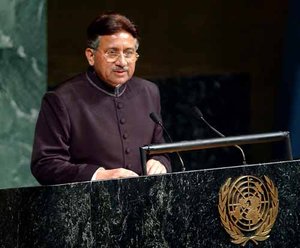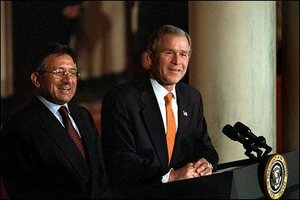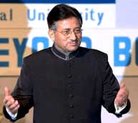Pervez Musharraf
|
|
| Missing image Lt_General_Musharaf.jpg Lt General Musharraf COAS and I Corp Commander (Mangla) | |
|---|---|
| Date of Birth: | August 11, 1943 |
| Date of Death: | – |
| President of Pakistan | |
| Tenure Order: | 12th President |
| Took Office: | October 12, 1999 – June 20, 2001 (de facto) June 20, 2001 – |
| Predecessor: | Muhammad Rafiq Tarar |
| Successor: | Incumbent |
| Chief of the Army Staff | |
| Tenure Order: | 13th Chief of the Army Staff |
| Took Office: | October 7, 1998 – Incumbent |
| Predecessor: | Gen. Jehangir Karamat |
| Successor: | Incumbent |
General Pervez Musharraf (Template:Lang-ur; born August 11, 1943, Delhi, India) became de facto Head of Government (using the title Chief Executive and assuming extensive powers) of Pakistan on October 12, 1999 following a bloodless coup d'état. He assumed the office of President of Pakistan (becoming Head of State) on June 20, 2001.
| Contents |
Early Years
Musharraf was born in Daryaganj in Delhi, India but moved with his parents to Karachi, Pakistan during the partition of India (1947). Both of his parents attended college; his mother's major was English Literature. She worked for the International Labour Organisation (ILO) and retired in 1986. Musharraf's father, a graduate of the Aligarh University in India, served in the Pakistan foreign service and led a distinguished career. He retired as the Foreign Secretary of Pakistan.
Musharraf was schooled at Karachi's Saint Patrick's High School and Forman Christian College, Lahore. A graduate of Command and Staff College, Quetta, and the National Defense College, Pakistan, General Pervez Musharraf also distinguished himself at the Royal College of Defense Studies, United Kingdom.
His supervisor, commenting on his performance remarked in his report: "A capable, articulate and extremely personable officer, who made a most valuable impact here. His country is fortunate to have the services of a man of his undeniable quality."
In 1961, he joined Pakistan Military Academy at Kakul and was commissioned in artillery regiment in 1964. He fought the 1965 war with India as a young officer and was awarded Imtiazi Sanad for gallantry. In 1967/68, he was promoted to Captain. He also achieved the Nishan-i-Imtiaz (military) and the Tamgha-i-Basalat. He has also been on the faculty of the Command and Staff College, Quetta and the war wing of the National Defence College. He volunteered to be a commando, and remained in the Special Service Group for seven years.
He also participated in the Indo-Pakistani War of 1971 as a Company Commander in the Commando Battalion. He has had the privilege of commanding artillery regiments and an armored division. On promotion to the rank of Major General on January 15, 1991, he was given the command of an Infantry Division and later of a prestigious strike Corps as Lieutenant General on October 21, 1995.
Musharraf has served on various important staff and instructional appointments during his career. He has also been the Director General Military Ops at the GHQ from 1993 to 1995. He rose to the rank of General and was appointed as the Chief of Army Staff, Pakistan on October 7, 1998 when Pakistan's army chief, General Jehangir Karamat was forced to resign after calling for military representation in a National Security Council of Pakistan. He was given additional charge of Chairman Joint Chiefs of Staff Committee on April 9, 1999.
On September 15, 2004, Musharraf backed down from his commitment to step down as Army Chief, citing circumstances of national necessity that he felt required him to keep both offices.
Coup d'état and election as President of Pakistan
Musharraf seized power in a bloodless military coup d'état on October 12, 1999, placing Prime Minister Nawaz Sharif under house arrest. Sharif had earlier chosen Musharraf as the Army chief over others presuming that Musharraf was easier to manipulate. Musharraf then dissolved the parliament and the state assemblies. He formally became President of Pakistan on June 20, 2001, just days before his scheduled visit for Agra Talks with India.
On May 12, 2000 the Supreme Court of Pakistan ordered Musharraf to hold general elections by October 12, 2002. In an attempt to legitimize his presidency and assure its continuance after the approaching restoration of democracy, he held a referendum on April 30, 2002, which extended his presidential term to a period ending five years after the October elections. However, the referendum was boycotted by the majority of Pakistani political groupings, and voter turnout was 30% or below by most estimates.
General elections were held in October, 2002 and a pro-Musharraf party, the PML-Q, won a plurality of the seats in the Parliament. However, parties opposed to Musharraf effectively paralyzed the National Assembly for over a year. The deadlock ended in December 2003, when Musharraf made a deal with the Muttahida Majlis-e-Amal party, agreeing to leave the army on December 31, 2004. With that party's support, pro-Musharraf legislators were able to muster the two-thirds supermajority required to pass the Seventeenth Amendment, which retroactively legalized Musharraf's 1999 coup and many of his subsequent decrees.
In a vote of confidence on January 1, 2004, Musharraf won 658 out of 1,170 votes in the Electoral College of Pakistan, and according to Article 41(8) of the Constitution of Pakistan, was "deemed to be elected" to the office of President until October 2007.
Views and perceptions of Musharraf
Image of a moderate leader

Musharraf is considered a moderate leader by Western governments. Many believe that Musharraf is sincere in his desire to bridge the Islamic and the Western worlds and has previously spoken strongly against the idea of the inevitability of a 'clash of civilisations' between them. Musharraf's emotional ties to the United States may be conjectured to be significant since at least two close members of his family live there: his brother, a doctor, lives in Chicago, Illinois and his son, who lives in Boston, Massachusetts. His son received his Bachelor's degree in Actuarial Science from University of Illinois at Urbana-Champaign and works for a benefits consulting company in Boston. Musharraf's only other child, a daughter, is a graduate of the National Council of Arts in Lahore and is an architect. Musharraf's elder brother, who was a Rhodes Scholar at Oxford, was a CSP officer in the Government of Pakistan prior to retiring from the International Fund for Agricultural Development (IFAD) in Rome, Italy.
Views considered relatively liberal
Musharraf was raised in a family that is considered liberal by Pakistani standards. The women of the family are unsequestered and seen and photographed in public without veils. His mother worked for the ILO and was friends with well-known Pakistani liberals. His daughter is an architect.
Shortly after coming to power, and on numerous occasions afterwards, Musharraf expressed admiration for the secularist reformer of Turkey Kemal Atatürk, outraging religious leaders in the country.
Musharraf has been open to making economic reforms and to modernize Pakistan. He is considered to be a modern, English-style officer, like the old Pakistan army before Muhammad Zia-ul-Haq's rule, which was heavily influenced by the United States and whose officers were often trained there.
Partner in the "War on Terror"
Since his involvement as a senior ofiicer of the Pakistan's special forces during the Soviet invasion of Afghanistan, Musharraf has had excellent personal relations with several sections of the US security establishement. Post his coup in 1999, President Clinton had called to protest and to be called back. Musharraf instead called General Anthony C. Zinni of the marines who was serving as the then head of CENTCOM (Middle East). Addressing him as "Tony", Musharraf continued on to explain his reasons and intended actions. General Zinni remained as one of Musharraf's strongest supporters prior to US foreign policy shifts post 9/11.
Following the September 11, 2001 Attacks Musharraf has worked closely with President of the United States George W. Bush in the "War on Terror" (causing widespread discontent among people in Pakistan for various reasons).
Shortly after the events of 9/11, Musharraf gave a watershed speech [1] (http://presidentofpakistan.gov.pk/PresidentialSpeeches.aspx) on Pakistan Television in which he pledged his and Pakistan's support to the United States in its war on terrorism. Though the Taliban was largely an independent phenomenon, there exists an impression that the Taliban regime is a product of the Inter-Services Intelligence agency of Pakistan working on the principle of 'Strategic depth' to ensure a Pakistan-friendly regime in Afghanistan and to reduce the number of refugees pouring into Pakistan and to prevent an already ailing economy. The new policy seemed to be a sudden 180-degree turn from the old one and was judged an indicator of Musharraf's sincerity by analysts at think tanks like the Brookings Institute.
Musharraf's support for the USA was indispensable in defeating the Taliban in Afghanistan with the ease that it was routed. This was done after his swift and strategically sound decision to cease Pakistan's long running support of the Taliban. Pakistan cut the Taliban's oil and supply lines, provided intelligence and acted as a logistics support area for Operation Enduring Freedom.
Musharraf speaks fluent English and has given many interviews and speeches on various US and European TV channels and other media. He has spoken at think tanks such as the Rand Corporation in Santa Monica, California, in June 2003. His support for the US-led War on Terror has been a cause for dislike by some right wing Islamic fundamentalist parties in Pakistan. The US's image in Pakistan has suffered ostensibly after the war in Iraq without a UN resolution. Musharraf has bluntly refused to send any Pakistani troops to Iraq without a UN resolution.
Popularity in Pakistan
Even though Musharraf's coup was not constitutional at the time, his rule is accepted by most Pakistanis. Independent polls have usually shown high public approval levels for Musharraf. Among the reasons for this popularity or acceptance is that the two previous Prime Ministers - athough democratically elected - were widely thought to be kleptocrats.
Another reason is that democracy in Pakistan is land ownership based, unlike western democracy. This means that a populace of an area (especially in rural Pakistan), usually is expected (and does) vote for that person, whom the major land owner of the area supports [2] (http://www.guardian.co.uk/comment/story/0,3604,1485461,00.html).
Musharraf also benefits from the prestige attached to Pakistan's Army which represents the most competent and respected institution in a republic where elected politicians have failed to establish a respect for the rule of law.
Assassination attempts
On December 14, 2003, General Musharraf survived an assassination attempt when a powerful bomb went off minutes after his highly-guarded convoy crossed a bridge in Rawalpindi. It was the third such attempt during his four-year rule. 11 days later, on December 25, 2003, two suicide bombers tried to assassinate Musharraf, but their car bombs failed to kill the president; 16 others nearby died instead. Musharraf escaped with only a cracked windshield on his car. It has been reported that Amjad Hussain Farooqi is suspected of being the mastermind behind these attempts, and there has been an extensive manhunt for him.
Elections during Musharraf's administration
On 12 May 2000, the Supreme Court of Pakistan ordered Musharraf to hold national elections by 12 October 2002, Elections for local governments took place in 2001. Elections for the national and provincial legislatures were held in October 2002, with no party winning a majority. In November 2002, Musharraf handed over certain powers to the newly elected Parliament. The National Assembly elected Mir Zafarullah Khan Jamali as Prime Minister of Pakistan, who in turn appointed his own cabinet.
Mushpressconf.jpg
On January 1, 2004 Musharraf won a confidence vote in the Electoral College of Pakistan, consisting of both houses of Parliament and the four provincial assemblies. Musharraf received 658 out of 1170 votes, a 56% majority, but many opposition and Islamic members of parliament walked out to protest the vote. As a result of this vote, according to Article 41(8) of the Constitution of Pakistan, Musharraf was "deemed to be elected" to the office of President. His term now extends to 2007. While Musharraf's 2002 referendum on his rule had been heavily criticized and dismissed by critics, his electoral-college victory has received much greater acceptance within and outside Pakistan.
Prime Minister Jamali resigned on 26 June 2004, and in his place the National Assembly elected Shaukat Aziz, a former Vice President of Citibank and head of Citibank Private Banking. The new government was mostly supportive of Musharraf, who remained President and Head of State in the new government. Musharraf continues to be the active executive of Pakistan, especially in foreign affairs.
Nuclear proliferation
Recently, Musharraf has come under fire in the west, after the disclosure of nuclear proliferation by Dr. Abdul Qadeer Khan, the metallurgist known as the father of Pakistan's bomb. Musharraf has denied knowledge of or participation by Pakistan's government or army in this proliferation despite deep domestic criticism for singularly vilifying Khan, a national hero. Musharraf continues to enjoy strong support of the White House and Defense Secretary Donald Rumsfeld. AQ Khan has been pardoned in exchange for cooperation in the investigation of his nuclear-proliferation network. The fate of these those who were found to have conspired with Khan is yet to be decided.
Mushvaj.jpg
Peace overtures with India
Musharraf was Chief of Army Staff at the time of Pakistani incursions into the Indian-held disputed territory of Kashmir (Kargil sector), in the summer of 1999. The Pakistani army was ordered to retreat. Some reports suggest that Musharraf retreated after huge pressure on the then Pakistani Prime Minister Nawaz Sharif from the American President, who feared the conflict could turn into a nuclear catastrophe. As this came just after the Lahore Peace Summit earlier that year, Musharraf was viewed with mistrust in India.
In the middle of 2004, Musharraf began a series of talks with India to solve the Kashmir dispute. Both India and Pakistan have the tactical capability to launch nuclear strikes on every single city within each others' borders. The two countries are continuing to aggressively increase their nuclear capabilities by actively producing even more nuclear weapons and perfecting their missile technologies by routinely conducting tests of ever more sophisticated missiles.
Pakistan has publicly stated that it reserves the right to 'exercise its nuclear option' in a large scale war with India. On the other hand India has a 'no first nuclear strike' policy enshrined in its nuclear doctine. In response Musharraf has instead offered a "no war pact" to India.
Recent developments
Recently, the president visited the Philippines last April 18-20,2005. The visit was to boost trade and commerce in their economic ties. President General Pervez Musharraf on May 11,2005 declared that exiled political leaders, including Benazir Bhutto and Nawaz Sharif, would not be allowed to come back or participate in the general elections scheduled for 2007.President Pervez Musharraf will seek another 5-year term as head of state after his current tenure ends in 2007, the country's Information Minister Sheikh Rashid recently informed the presses.
In May 2005, he said he would prefer some kind of "international guarantees" for implementation of any pact reached with India on the Kashmir issue which he wants to be settled in a year's time.


